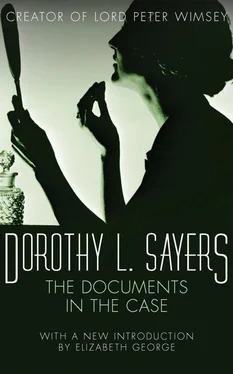I recognised the handwriting in which Lathom had written out Munting’s address for me.
‘Well, it was very tiresome,’ I said, ‘but I am sure you did all you could. There was money in the pocket-book, I suppose?’
‘Yes, sir, and the gentleman’s ticket to town. He was in quite a way about it, because he said he hadn’t enough money on him to book again. So I spoke to the ticket-collector, and he said he would make it all right on the train, and Mr Lathom could settle it with the Company when he got to town.’
These inquiries had taken the greater part of the day, so I decided to stay that night in Newton Abbot and interview the ticket-collector the next day. He was still on the same train and perfectly recollected the affair of Lathom and his ticket. I went on up to Paddington with him, and there the friendly collector directed me to the official in the Inquiry Bureau who had dealt with the matter on the previous occasion. After considerable referring back and forth and ringing up the head office, it was clearly established that Lathom had duly arrived by the 1.15, without his ticket, had explained the circumstances and had left his name and address, promising to send the ticket on if it turned up. As a matter of fact, it never turned up, but as the booking-clerk at Bovey Tracey had clearly remembered issuing it and had identified Lathom on his next visit as being the person to whom the ticket had been issued, the Company accepted the explanation and allowed the matter to drop.
This was something of a blow. I had really reckoned more than I realised on finding that Lathom had left the train at some point and doubled back to Manaton. There was just one possibility. He might have hurried across to the down platform and taken the 1.30, which would land him back at Bovey Tracey at about half-past six. This would have meant very quick work, for the explanation to the authorities at Paddington must have taken him nearly ten minutes. And at the other end he would have had to get, somehow or other, to Manaton and then do the three miles out to ‘The Shack’, and then snatch his opportunity to rush in unseen, and drop the poison into the stew while my father’s back was turned. It seemed almost impossible. Apart from everything else, it was inconceivable that he should not have been seen, either at Newton Abbot or at Bovey Tracey. He would have had to pass the barrier, and he would have had to hire a car, for nothing else would have got him to ‘The Shack’ before supper-time.
I turned it over and over in my mind and could make nothing of it. It seemed that I must abandon this whole theory. I returned to my hotel in a mood of deep depression, and found there, waiting for me, a letter from Munting, which I append here in its place.
50. John Munting to Paul Harrison
Dear Harrison,
A damnably awkward thing has happened. Lathom turned up here last night. The girl showed him straight into my study and I was caught without hope of escape.
He looked nervous and irritable, and came straight to the point.
‘Look here,’ he said, ‘has this fellow Harrison been round to see you?’ I hesitated, and he went on at once, ‘Can’t you say yes or no? What’s the good of lying about it?’
‘Yes,’ I said, ‘he came round.’
‘What did he want?’
I said you were naturally anxious to have all available details about your father’s death.
‘Yes, that’s all very well,’ he cut in angrily. ‘What have you been saying to him? Have you been discussing my private affairs?’
‘I don’t think,’ I answered cautiously, ‘I told him anything that he didn’t know already.’
‘Have you been spreading scandals about Mrs Harrison and me? Come on, out with it!’
‘Sit down,’ I said, ‘it’s no good shouting at me like that.’
‘Sit down be damned! I suppose you’ve been chattering as usual. I should have thought you would have the decency to shut up about what wasn’t your business. I warned you about him, didn’t I? Why couldn’t you keep the fellow out?’
‘My dear man,’ I said, ‘if I’d refused to see him, he’d have thought there was something very suspicious about the business.’
‘So I suppose you blabbed it all out like a good, virtuous little boy.’
‘As a matter of fact,’ I said, ‘he seemed to know all about it.’
‘Nonsense! How could he know, unless you told him?’
‘Possibly,’ I said, ‘he gathered it from your manner, or from Mrs Harrison. Besides,’ I added, feeling that attack was my only possible form of defence, ‘I thought you told me it was all over and done with. Isn’t it? I assured Harrison that it was. I had only your word to go on. If it wasn’t all over, what the devil did you mean by taking me down to Devon with you? You know perfectly well that if I’d known it was still going on, wild horses wouldn’t have taken me down there.’
This brought him up all standing.
‘Yes, well,’ he said, ‘of course it’s all over. But why did you have to tell him anything about it at all?’
‘Look here,’ I said, ‘you’ve not been straight with me, and I don’t believe you now. I’ve had quite enough of this. You’ve dragged me into this business again. I’ve been your scapegoat once and I’m fed up. Do you expect me to go on taking the blame for your idiotic love-affairs? I’ve got my wife to consider.’
I was afraid he would go back to the very difficult question of how you got to know about the intrigue. I didn’t want to tell him about the letters, which you had shown me more or less in confidence, and yet I felt a perfect cad for not warning him of his danger. It seemed abominable to have listened to such suspicions against a man, without giving him the chance to clear himself. Fortunately, he abandoned this point.
‘What does the fellow want?’ he went on. ‘What’s he think he’s going to find out? The thing’s clear enough, isn’t it?’
‘Well,’ I said, ‘to tell you the truth, Lathom, when I came to consider the thing I couldn’t help suspecting—’
‘Suspecting! My God, you’ve got your beastly suspicions now. What in the devil’s name do you suspect?’
‘I couldn’t help suspecting,’ I went on, as steadily as I could, ‘that old Harrison had found out something and committed suicide.’
‘Oh!’ said Lathom. ‘Well, what if he did? The man was a—’ (a word which I will spare you). ‘The best thing he could do was to clear out from a place where he wasn’t wanted. Damn good riddance. A good thing if he did have the sense to see it.’
‘That’s a pretty rotten thing to say, Lathom.’
‘Don’t be such a damned hypocrite.’
‘I mean it,’ I said. ‘You’re behaving like an absolute swine. Harrison was damned decent to you, and you seem to think that just because you can paint better than he could, you are perfectly justified in seducing his wife and then accepting his hospitality and driving him to commit suicide.’
‘I hadn’t anything to do with it,’ he retorted, ‘he was all right when I left him. You ask anybody down there who saw him. He was as cheery and friendly as could be. I’m not responsible for what he did behind my back. I was in London all the time. I can prove it.’
‘I don’t see that it needs proving,’ said I.
‘Oh, don’t you?’ he burst out violently. ‘Well, I do. You’ll be saying next that I had something to do with his death.’
He stopped suddenly and I caught him looking sideways at me, as if to see how I should take this suggestion. It turned me quite cold, and I had a curious sensation as if my stomach had turned right over.
‘Well,’ I said, ‘if anybody heard you talking like this, they might be excused for thinking so.’
‘Oh, might they!’
Читать дальше












